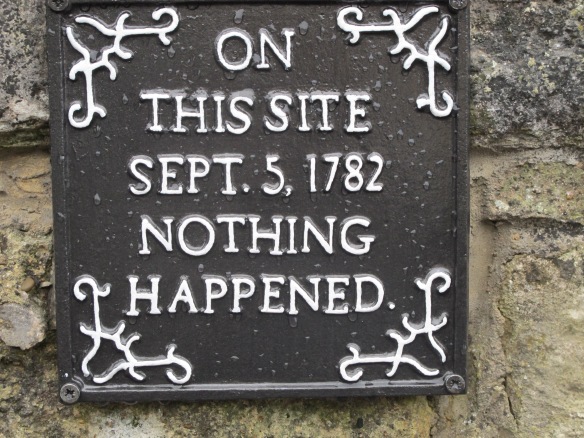P. and S. sent me a clipping from their local paper, in which columnist Ericka Waller, moved by the refugee crisis, kindly offers newcomers an eight-point guide to being British. I won’t cover all her points—that dances on the border of copyright violation, not to mention bad manners—but I’ll paraphrase a couple of them. Read the rest for yourself, because you need to know this stuff, even if you’re not British and have no intention of being. And even if you’re already British. With the government’s emphasis on British values these days, you don’t want to give someone the wrong impression, do you?
Besides, it’s a good article.
Point number 1: To be British, you must greet people by asking, “How are you?” but if they ask you the same question the only possible answer is, “I’m fine, thanks.” If you say you’re wonderful, you’re being a showoff. If you say you’re terrible, you’re moaning. If you follow that by going into the details of your toothache or unpaid bills, you’ll either scare people or embarrass them. Or both. People don’t ask because they want to know, they just want to seem polite. Emphasis on seem.
The how-are-you? rule shares a common root with American greeting rituals. We (that’s Americans) ask without remembering that it’s a real question, although we do allow room for someone to say, “Wonderful,” or, “Tired, thanks,” or something along those lines. We also appreciate an occasional twist in the answer—something along the lines of “better than nothing.” But your toothache? Your unpaid bills? The thousand ways your life’s threatening to fall apart? Nope. We don’t want to know either.
When Wild Thing first started to work as a therapist, she’d occasionally run into clients out in the real world, and if they greeted her she greeted them back. (If they didn’t, she walked on. Being a therapist is—says me who’s never been one but was in a position to observe—deeply weird.) She had to learn not to ask, “How are you?” because in the relationship they’d established that it was a real question. Some people would actually answer. In the middle of a supermarket aisle.
On the flip side, I went to the doctor once about I can’t remember what, and when she walked in and asked how I was I automatically said, “Fine. You?”
She managed not to slap her forehead—or mine—but I expect she wanted to. Imagine that happening to you twenty times a day.
Point number 2: To be British, you must also tut and learn to respond to tutting. “Nothing says Brit like a disapproving tut,” Waller writes. “As you finish the tut, raise your head slightly and roll your eyes elaborately to the heavens for extra punch.” And if someone notices and asks what’s wrong, deny everything. You’re not allowed to explain a tut or say how you actually feel.
As a rule, Americans don’t tut. Or I don’t think we do. But my understanding of the subject is colored by—how am I going to explain this to you? I don’t do well with subtle. If you want to insult me, you need to be clear or it’ll go over my head and where’s the fun in that?
This was a problem in Minnesota, where the official language is Indirect English. Wild Thing was called into service periodically to interpret for me. So maybe I’ve been tutted at all my life and didn’t notice. But I don’t think so. I think we leave the tut, like the tea, to the British.
I’m only aware of British tutting because I’ve been reading about it, both in Waller’s article and in Kate Fox’s wonderful Watching the English. So this is a nation that not only tuts but writes about tutting and ponders the deep cultural meaning of tutting. It wouldn’t be too much to say, the philosophy of tutting. This is a nation that cares about tutting.
The tut is powerful here—or so Fox says. Someone jumped the queue? If they’re British, a lone tut will be enough to shame them back into place. And in case you’re American, you need to understand that a queue is a line, and standing in line is the real British national religion. The Church of England? That’s for show. So we’re talking about someone violating the country’s most sacred principle. And a tut will be enough to remind them of it.
It sounds as if Fox differs from Waller on the tut’s power, but underneath there somewhere I expect they’d agree that it’s power comes from not needing to be explained (or something along those lines—we’re getting into murky waters here) and it will be understood regardless of how much it’s denied.
It’s a wonder this country’s let me stay.

